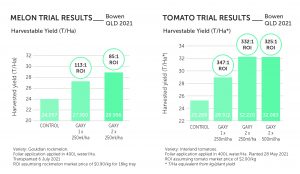Improving harvest yields and quality with biostimulants
There is a new biostimulant now available to Australian vegetable growers. It is a 100 per cent cold-pressed super-concentrated extract of Ascophyllum nodosum filtrate, which is delivering yield benefits as a foliar product in horticultural and orchard crops. Vegetables Australia reports.
Seaweed extracts aren’t a recent addition in horticulture, but the latest release from UPL Australia is setting a new benchmark in biostimulants for Australian growers.
GAXY® is a super-concentrated Ascophyllum nodosum filtered extract, using a patented technology to preserve the natural ingredients.
This unique process of extraction, filtration and evaporation preserves and concentrates the extract to ensure high quality, purity and integrity of this concentrated extract.
“What this means for growers is much lower application rates and excellent compatibility with tank mixing products compared to competing seaweed extracts in the market,” UPL Australia BioSolutions Manager Neil Innes said.
A cool temperature manufacturing process that guarantees the stability of the raw material is used, and all the physiologically active characteristics of the fresh seaweed are retained. The material begins its extraction process within 24 hours of harvest, allowing for a consistent and high-quality product.
This unique patented process also removes unwanted material such as alginates and cellulose from the formulation, allowing for a high concentration of biologically active molecules in the finished product.
The seaweed filtrate stimulates plant nutrition and polyamines synthesis to improve fruit set and the quality of harvested fruit.
How it works
Unlike many competitors on the market that utilise alkaline products to speed up the kelp extraction process, GAXY is unique in its mild process technology. Alkaline extracted biostimulants – when mixed into the spray tank – may lead to incompatibility reactions with crop protection products and certain nutrients.
“Fewer spray applications at low-use rates and the ability to tank mix applications more readily all contribute to efficiencies on-farm,” Neil said.
“But the greater benefits are in the improved fruit set and produce quantity and quality that can be achieved by using it.”
The biologically active molecules help to stimulate plants to increase moisture and nutrient use efficiency. Increased moisture and nutrient use efficiency assist in achieving optimum yield and quality of the crop.
“When you’re paying top dollar in the current market for nutrients, you want to make sure you’re utilising and maximising your return from them,” Neil said.
A key mode of action of GAXY is the activation of flowering hormones involved in fruit production due to the stimulation of polyamine synthesis.
“Polyamines play a role in flower set, growth activation, maintenance of cell wall integrity and seed germination,” Neil explained.
“For example, fruit position and size correlates to the plant’s polyamine content. The end result is improved yields and more even fruit size, which also results in less waste produce.”
UPL is a leading global provider of BioSolutions, and considerable time has been spent researching and selecting the products best suited to the Australian market.
“Our BioSolutions range is tried and tested overseas, and has decades of research behind it,” Neil said.
“We’re looking forward to bringing these benefits to Australian growers.”
Trials produce positive results
UPL has been trialing GAXY extensively in Australia, and the company’s BioSolutions Manager Neil Innes says the results are very pleasing.
Trial results in 2021 winter season of cucurbits applied at the key growth stage of BBCH13 (3 true leaf) showed yield increases from one- or two-timed applications, to the extent of 40:1 return in zucchini and 100:1 in melons*.
“More recent trials in tomatoes reinforced one or two applications are doing the positive ‘grunt work’ for yield, with the extra vigour resulting in increased fruit fill and maturity of fruit,” UPL Australia’s Neil Innes said.
“GAXY treatments gave 27.5 per cent more yield than the control (that received no biostimulant application), which was an average of 5.6 more pieces of fruit per plant.”
Find out more
GAXY is available from agricultural supply outlets. For more information, please click here.
* Returns assuming rockmelon market price of $0.90/kg for 18kg tray; zucchini market price S/M @ $2/kg; M @ $1.80/kg; M/L @ $1.40/kg; & tomato market price of $2.00/kg


